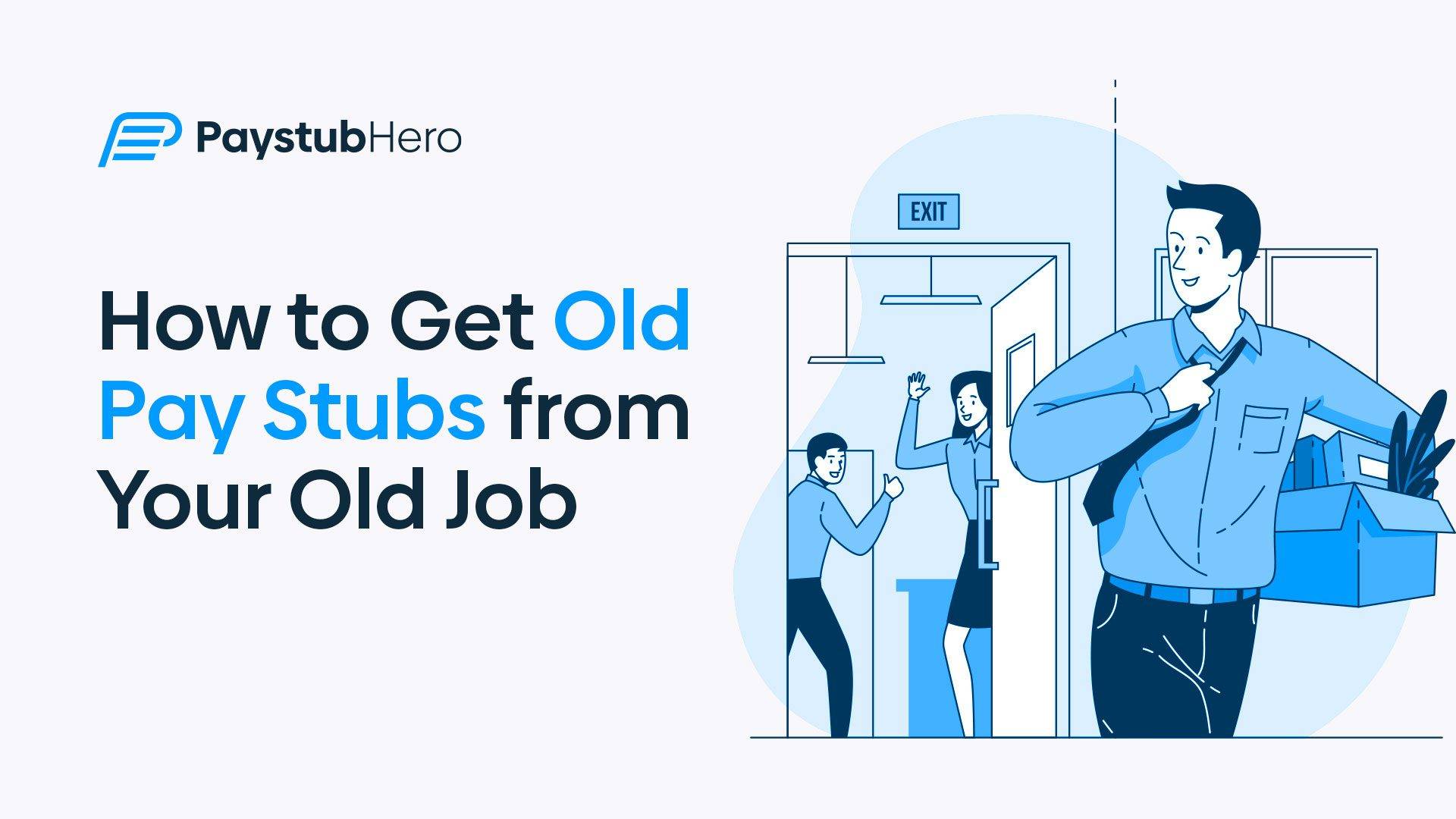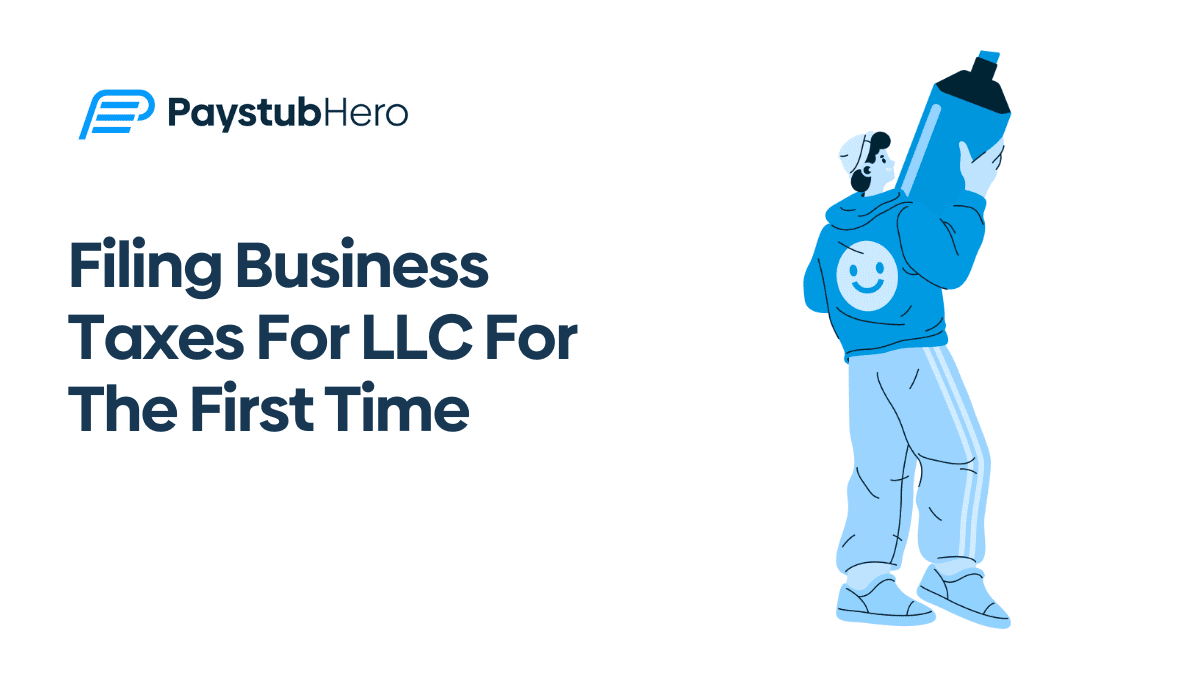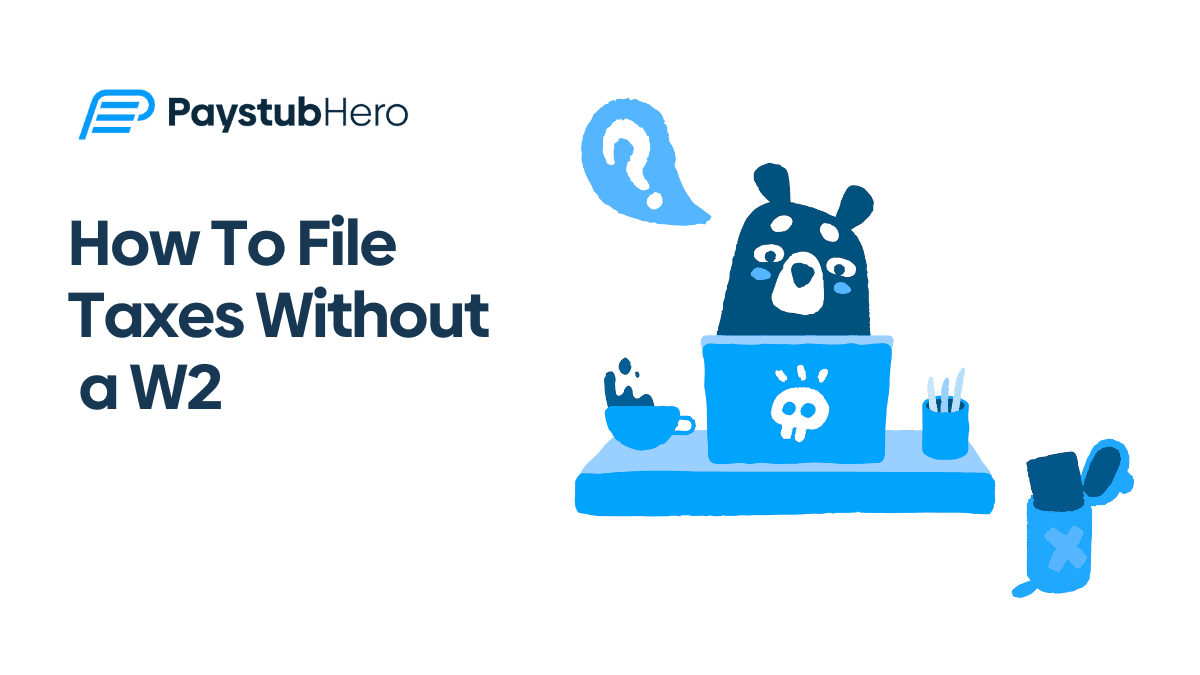Navigating the maze of past employment paperwork can be a daunting task. Whether you’re applying for a new loan, preparing your taxes, or simply trying to reconcile your financial records, you might find yourself faced with the need for your old pay stubs.
It’s quite easy actually, they can be found by simply reaching out to your old employer, and other quick and easy methods!
If you’ve ever switched jobs, you know that maintaining a trail of employment history is not always a straightforward process.
Perhaps you’ve moved around a lot, or maybe your old company has gone out of business. Either way, obtaining those crucial paycheck records can feel like a Herculean task.
You may find yourself asking, “How can I get old pay stubs from my old job?” We’ve all been there – staring at an empty screen, trying to piece together our employment history from memory and the occasional saved email.
But there’s no need to panic or embark on a frantic search through your attic for those elusive papers.
This article is designed to guide you through the process of retrieving your old pay stubs, offering practical and actionable steps that can turn this seemingly arduous task into a manageable one.
Whether it’s contacting your previous employer, exploring online paystubcreator services, or understanding how to use your end-of-the-year pay stubs, we’ll cover all the bases.
So, if you’re asking, “How can I get my old pay stubs from my old job?” – fret not. This comprehensive guide aims to answer just that.
Let’s embark on this journey together, turning what might seem like a complex problem into an achievable task.
The Importance of Old Pay Stubs: Why You Might Need Them
Before diving into the ‘how’, it’s crucial to understand the ‘why’. Why would you need old pay stubs? Aren’t they just pieces of paper that serve no purpose once the paycheck has been cashed?
The answer to that is a resounding no. Pay stubs – old and new – hold significant value and can be needed for a variety of reasons.
Maybe you’re applying for a mortgage or a car loan, and the lender wants proof of your past income. Or perhaps you’re renting a new apartment, and the landlord needs assurance that you’re financially stable.
In both these scenarios, your old pay stubs can serve as a testament to your earning history, providing the evidence needed to secure that loan or lease.
Moreover, old pay stubs can be a lifeline when preparing your taxes. They contain valuable information such as your earnings and the amount of tax you’ve already paid, which can help ensure accuracy when filing your tax return.
In some cases, you may even need them to dispute inaccuracies in your Social Security earnings record, which could impact your benefits later in life.
Also, if you ever find yourself in a situation where you need to prove your employment history – say for a background check or a visa application – those old pay stubs can come in handy as proof of your work tenure.
So while it might seem like a chore to dig up old paycheck records, the importance of these documents shouldn’t be underestimated. They’re not just records of where your money has come from – they’re a vital part of your financial history.
Reaching Out: How Contacting Your Previous Employer Can Help Retrieve Old Pay Stubs
The direct route often proves to be the best one, and this holds true when trying to retrieve old pay stubs. The most straightforward way to get your hands on these documents is to reach out directly to the source: your previous employer.
It’s a common misconception that once you leave a job, you sever all ties with your former employer.
In reality, companies are legally required to maintain records of employment, which includes pay stubs, for a certain period of time. This period varies depending on the jurisdiction but is typically a few years. This means that even after you’ve moved on, your old employer should still have a copy of your pay stubs on file.
But who do you contact, and what’s the best way to approach them?
Generally, your first point of contact should be your former company’s payroll or human resources department. They manage employee records and should be able to assist you in retrieving your old pay stubs.
When reaching out, be polite and clear about your request. Specify the pay periods for which you require stubs and provide any relevant information that could help expedite the process.
Keep in mind that bureaucracy can sometimes slow down the process, so patience might be required. It’s also wise to follow up if you don’t hear back within a reasonable timeframe.
Remember, the goal is to retrieve your paycheck records, and persistence can pay off.
So, if you’re wondering, “How to get old pay stubs from my old job?” don’t underestimate the power of a direct request to your previous employer. It’s a tried-and-true method that has helped countless individuals retrieve their much-needed paycheck records.
Embracing Technology: Using a Pay Stub Creator to Retrieve Your Old Pay Stubs
In today’s digital age, the paper trail has increasingly given way to the pixel path. Many companies have transitioned from handing out physical paychecks and pay stubs to using digital platforms for payroll management.
This shift towards digitization can significantly simplify the process of retrieving old pay stubs.
If your former employer used an online payroll service or a paystubcreator, your task becomes even more straightforward. These digital services offer an archive of your past pay stubs that can usually be accessed even after your employment ends.
Renowned payroll service providers such as ADP, Paychex, and Gusto not only manage current payroll but also store past records.
If your previous employer used one of these services, you might be in luck. All you need to do is log into your account, and you’ll find your old pay stubs neatly organized and easily accessible, often downloadable in a printer-friendly format.
Even if you’re unsure whether your old job used a paystubcreator, it’s worth reaching out to your former HR or payroll department to ask. They can provide the necessary information and might even guide you through the process of accessing your old pay stubs.
Embracing the power of technology can make the task of retrieving old pay stubs a breeze.
So, if you’re wrestling with the question, “How to get old pay stubs from my old job?”, consider the digital route. It’s a testament to how technology is simplifying what used to be cumbersome tasks and making our lives a little bit easier.
Exploring Official Channels: How Checking with Government Agencies Can Help Retrieve Old Pay Stubs
Sometimes, despite your best efforts, reaching out to your former employer or accessing a paystubcreator might not yield the desired results. Whether it’s because your old company has gone out of business, or they’ve purged their records, or you’re dealing with an unresponsive HR department, you might find yourself at a dead end.
But don’t despair just yet. There’s another avenue you can explore to retrieve your old pay stubs: government agencies.
The Internal Revenue Service (IRS) is an often overlooked resource in the quest for old pay stubs. If you’re a U.S. worker, every year your employer sends a copy of your W-2 form to the IRS. This form contains most of the same information as a pay stub, including your income and the amount of taxes withheld.
By requesting a transcript of your W-2 form from the IRS, you can obtain a record of your earnings.
To request this transcript, you can visit the IRS’s “Get Transcript” page. There, you’ll be able to choose the type of transcript you need and the tax year you’re interested in.
Remember, though, this route may take some time, so it’s best used as a backup option or when you have ample time to spare.
In some states, other government agencies may also keep records that could help. State labor departments often have wage information on file and might be able to assist you in retrieving your old pay stubs.
So, if you’re scratching your head, wondering “How to get old pay stubs from my old job?” remember that government agencies can be a valuable resource.
They can offer an alternative solution when traditional routes fail, keeping you on track in your quest for those elusive paycheck records.
The Annual Summary: How Your End of the Year Pay Stub Can Provide Crucial Information
In the hustle and bustle of our lives, it’s easy to overlook some resources that are right under our noses. One such resource, especially when it comes to retrieving old pay stub details, is your end of the year pay stub.
While we often view pay stubs as transient documents that lose relevance once the pay period is over, the end-of-the-year pay stub is an exception. This particular pay stub serves as an annual summary of your earnings, taxes, and deductions. It contains a wealth of information, making it a valuable document long after the year has ended.
If you’ve been diligent about keeping your end of the year pay stubs, you might already have much of the information you need. This document typically includes your cumulative earnings for the year, the total amount of taxes withheld, and other deductions such as health insurance or retirement contributions.
This comprehensive summary can serve the same purpose as your individual pay stubs in many situations, such as when filing taxes or applying for a loan.
But what if you didn’t keep your end-of-the-year pay stub? It’s still worth reaching out to your previous employer or their payroll provider.
They may be able to provide this annual summary, which can be a quicker and simpler way of obtaining the information you need, compared to gathering individual pay stubs for every pay period.
So, when faced with the question, “How to get old pay stubs from my old job?”, don’t forget the potential of your end-of-the-year pay stub. It’s a testament to the saying that sometimes, the whole is indeed greater than the sum of its parts.
Enlisting Expert Assistance: When to Consider Getting Professional Help to Retrieve Your Old Pay Stubs
There comes a point in any challenge when you might need to call in the experts. Retrieving old pay stubs can sometimes prove to be one such challenge.
If you’ve tried contacting your previous employer, attempted to access a paystubcreator, explored government agencies, and even examined your end-of-the-year pay stub, but still can’t locate your old pay stubs, it might be time to consider getting professional help.
Engaging a professional doesn’t signify defeat; rather, it’s a strategic move to navigate more complex situations.
For instance, you might be dealing with a dispute with your former employer over unpaid wages or discrepancies in your pay. In such cases, the expertise of an employment lawyer or a labor advocate can be invaluable.
Another scenario where professional assistance might prove beneficial is when dealing with tax complications. If you’re unable to retrieve your old pay stubs and need them for tax purposes, a certified public accountant or a tax attorney might be able to provide alternatives or workarounds.
Remember, professionals in these fields deal with issues like these regularly and are equipped with the knowledge and resources to handle such situations effectively. They can guide you through the process, helping you understand your rights and options.
So, if you’re left wondering, “How to get old pay stubs from my old job?” and traditional methods aren’t working, don’t be hesitant to seek professional help. They can offer tailored advice and solutions, turning an uphill task into a manageable one.
The Art of Organization: Why Record Keeping is Key in Managing Your Pay Stubs
Retrieving old pay stubs can be a challenging process. However, the difficulty of this task can be significantly reduced by practicing one simple habit: effective record keeping.
While this might seem like an obvious solution, the value of maintaining organized and up-to-date records of your pay stubs can’t be stressed enough.
Let’s face it – life gets busy. Amid juggling work, family, and personal obligations, keeping track of pay stubs might not be at the top of your priority list. It’s easy to overlook these documents, especially when there’s no immediate need for them.
But as we’ve seen, there are numerous situations where you might need to refer to your old pay stubs.
The beauty of effective record keeping is that it prepares you for these situations in advance. By saving your pay stubs – whether physically or digitally – and organizing them in a methodical way, you’re ensuring that they’re readily available when needed. This proactive approach can save you significant time and effort down the line.
As for how to do this, consider creating a dedicated folder for your pay stubs, both in your physical files and on your computer or cloud storage. Label each pay stub clearly with the date and the employer’s name to make them easy to locate.
Also, remember to back up your digital files regularly to prevent data loss.
In conclusion, the question of “How to get old pay stubs from my old job?” can be made much simpler by practicing good record keeping. It’s a small step that can make a big difference, turning a potentially stressful situation into a straightforward task.
After all, as the saying goes, “An ounce of prevention is worth a pound of cure.”
Wrapping It Up: Final Thoughts on How to Get Old Pay Stubs from Your Old Job
As we draw this comprehensive guide to a close, it’s important to reflect on the journey we’ve taken together. We set out to answer a seemingly complex question: “How to get old pay stubs from my old job?”
Through a step-by-step exploration of various methods and resources, we’ve turned this daunting task into a feasible one.
We’ve understood the value of old pay stubs and why they might be needed.
We’ve explored the direct approach of contacting your previous employer and the role technology can play through paystubcreator services.
We’ve considered the aid government agencies can provide and the treasure trove of information your end-of-the-year pay stub holds.
We’ve also discussed when and how to seek professional help.
But perhaps most importantly, we’ve learned the pivotal role of effective record keeping.
This practice not only simplifies the process of retrieving old pay stubs but also helps manage your financial life more efficiently.
It’s also worth noting that while this guide provides a broad framework, the specific process may vary depending on your individual circumstances and the laws in your jurisdiction.
But armed with the knowledge and resources outlined in this guide, you’re well-equipped to navigate any challenges that arise.
As we wrap up, remember that retrieving old pay stubs doesn’t have to be a Herculean task.
By understanding your options and taking a strategic approach, you can successfully retrieve your old pay stubs and use them to propel your financial journey forward.
In the end, it’s about empowering yourself with knowledge and tools that turn seemingly complex questions into manageable tasks. That’s the power of information, and that’s what we strive to provide with guides like this one.








